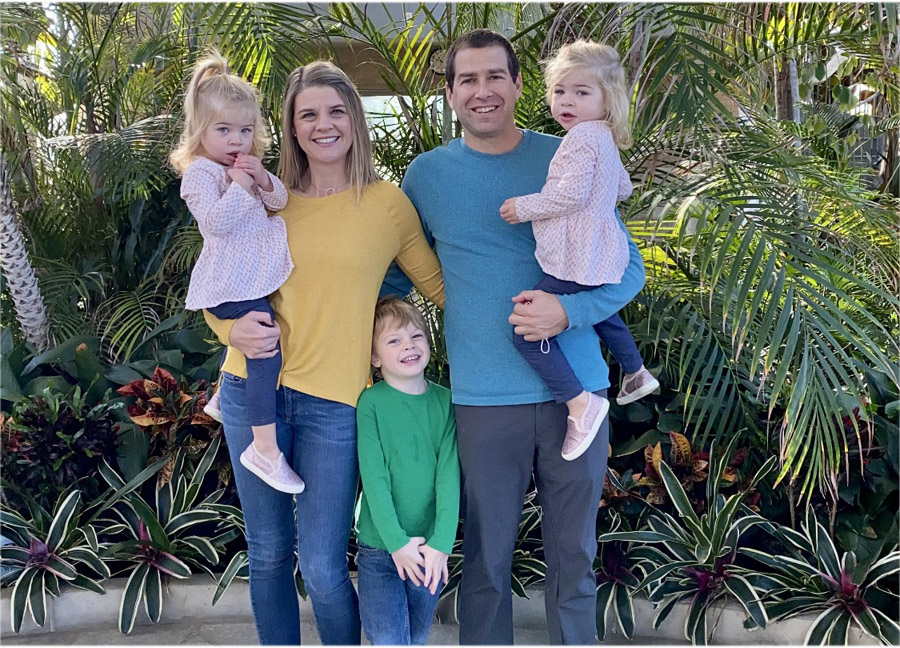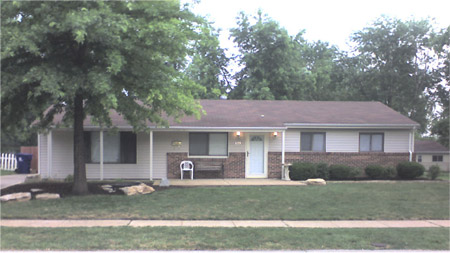
“I wanted to get money out of the way so I could spend my time with kids and a wife (I didn’t yet have.)”
Greg Wilson retired recently at 42. But he started planning for financial independence and early retirement when he was a teenager: “I am the son of a business owner who’s favorite child was his business. I didn’t want that for myself and my future wife and kids. So I invested early. I recently retired from my career in Financial Services and live off of income from rental houses and a lifestyle blog we bought for mostly passive income.”
Today, Greg has three kids under age five, and his wife Erin stopped working three years ago when their twin children were born. Intrigued? Here’s how they did it.
Greg’s First Investment Property
“The story of my first one is kind of fun to me. I graduated college when I was 20, moved back to St. Louis, and was living in an apartment. I had been researching and planning to buy my first rental for years now. I spent a lot of time in the library learning. I surveyed many landlords and tenants asking so many questions. I knew I was ready.
“So I walked into a real estate agent’s office and said ‘I’m going to buy a house today.’ I looked so young. They dismissed me. I then made it clear I wasn’t leaving So they went in the back and got ‘Elmer.’ Elmer looked like he had retired five years earlier. He either needed a sale or needed something to do. He didn’t want to deal with me, but they made him. I told him, ‘Elmer, I am going to buy a house today.’
“I explained I wanted to look at five houses that day. I told him specific specs of what I wanted including location. I let him know the plan was every one of the houses was worth something to me and we were going to make offers based on what they were worth to me, Even if it was $1. We looked at five houses. I bought one. It was $83,000 with $800 down. The seller contributed to my down payment. I made no repairs.
“The house cash flowed a few hundred a month, so I refinanced it down to a shorter term. My goal was to have tenants pay off my rental property loans as quickly as possible, not monthly cash flow. I didn’t want to make the banks rich, I wanted to pay off houses. I continued to live in my apartment but rented out the single-family house.”
And no, Greg didn’t earn a high salary when he bought his first rental property. He earned a whopping $25,000 per year. If he could do it, so can you.
Scaling & Greg’s Plan to Retire
“I continued buying properties from there. Sometimes I used real estate agents. Sometimes I negotiated without agents. Other times I had the seller agent represent both sides. What changed the most with experience is I realized I didn’t need an agent.
“I also quickly realized not to buy houses with basements or garages. Basements and garages are extremely common in St. Louis. I avoided basements and garages because tenants would leave twice as much stuff and it would also be twice as much flooring/painting, but the increase in rent didn’t justify it. Also, with basements sometimes you get ‘mystery tenants’ that never signed your lease agreement.
“The biggest mistake I had to learn from had to do with people. Relationships were really tough because girlfriends (and their parents) didn’t understand my plan. I also tried to involve friends early on. I included very generous payouts that they didn’t understand so they thought I was trying to cheat them. I just didn’t understand — what seemed simple to me wasn’t clear to them. It ruined friendships.
“I scaled my portfolio to eight houses very quickly. That was a magic number. For my niche, eight to ten houses was enough that I could easily manage without hiring a property manager or quitting my day job.
“I knew if I wanted to quit my day job then I needed to jump up to 20. That wasn’t my plan. My plan was to pay off enough rental houses to last me from age 40-something to 60, and for my 401(k) plan to last me from 60 until death.
“But those first 8 houses, I bought with a total of $800 out of pocket, no help from friends/family, while I was making $25-60k in my day job.”
Related Article Read: How to Find Pre-foreclosure Listings.
Related Article Read: Guide to Driving For Dollars.
Greg’s First Crisis: Lawsuits & Loans
“I had worked out an arrangement with my lender. The president of a community bank trusted my models and gave me a chance to fail. He personally underwrote five of my mortgages. The catch? He could call them if I ran into issues.
“My low point as an investor came when I was sued. I bought a house in foreclosure. The previous owner’s daughter put a claim on the house.
“Since I held a mortgage, not only was I being sued but so was the bank. So I was nearly in tears. Totally shaken up. I called the president of the bank literally shaking. I thought he was going to call $500k+ in mortgages.
“Instead, he laughed and said in a fatherly way, ‘Greg, congrats you’ve arrived’ I was so confused. ‘He said, don’t worry about this. You do the right thing so this will work itself out. Hang in there. You’re only being sued because you’ve arrived.’”
Municipality Headaches
“The municipality where I had most of my houses did not want rental houses, they wanted homeowners. They were not shy about it.
“One way they fought rentals was with inspections. I once had a house fail an inspection (which meant the tenant couldn’t move in) because they said a pool was in the backyard. A pool wasn’t in the backyard. They said I had to dig up the backyard and prove to them there wasn’t a pool.
 “I offered affidavits from neighbors or a historical google satellite image. They said no. The ground was frozen since it was winter. I asked them to say where it was so I could get a shovel and dig that spot. They replied, ‘It is in the backyard.’
“I offered affidavits from neighbors or a historical google satellite image. They said no. The ground was frozen since it was winter. I asked them to say where it was so I could get a shovel and dig that spot. They replied, ‘It is in the backyard.’
“I asked what the concern was, and they responded ‘hydrostatic pressure.’ I tracked down someone that lived there 20 years earlier. He happened to work at a pool company and did install a pool a long time ago. He said there was no chance of hydrostatic pressure because the floor of the pool was made out of compressed sawdust.
“The municipality wouldn’t accept his testimony. We rented an excavator and dug up the backyard. They were satisfied. Their bullying was complete and we got our permit.
“For me, the municipality where I invested has been the biggest headache. The tenants were easy.”
Greg’s Advice for New Real Estate Investors
“The biggest advice I can give is the same advice Mark Cuban gave me before anyone really knew who he was. He had a blog in the early 2000s. I emailed him because I was in grad school not learning anything but I was interested in real estate.
“To paraphrase, he said something to the effect that ‘At some point, you need to stop wasting time and just go learn by doing. If you are thinking about buying a rental house, go buy a rental house.’ Use resources like SparkRental to help you figure it out as you go. On a long enough timeline you’ll be fine.”
What other advice do you have for novice real estate investors?
“Find a great and reliable contractor that is amazing at troubleshooting. They are a dying breed but they are your biggest partner.
“Standardize as much as possible. For example, paint the interiors the same color, that way you just touch up most of the time and you also don’t have a garage full of paint cans. It also lets you buy the paint on sale and save it for later. We keep a five-gallon bucket of “parchment paper” paint and white semi-gloss. It saved so much time.
“Lastly, tenants are people. Treat them like people. So many landlords think they are the boss or nickel and dime tenants. Don’t do that. My job as a landlord has always been customer service. Look at it that way and you’ll retain good tenants and come out ahead.”
(article continues below)
Diversifying Into Online Business
Greg doesn’t just invest in real estate. Last year, he and his wife bought ChaChingQueen.com, a lifestyle blog about “living a big life on a little budget.”
“I was running with a friend last year. He owns a lot of businesses. I told him I was ready to retire but we were $1,500 short in covering our monthly expenses. He gave me amazing advice: ‘Whatever you do, don’t buy more single-family residential houses.’
“His reasoning? ‘You already know how to do that. You’re 42. Do something that makes you go to the library and makes you want to learn. If you fail, you can always just go buy more residential single-family rental properties.’
“A few days later another friend told me he bought a dumbbell review site to generate passive income. So my wife and I started shopping for a lifestyle blog. ChaChingQueen was perfect — it covers my strengths in finance. It covers Erin’s interests in food and green cleaning, and both of our interests in family and fitness. It also lets her have fun doing social media.”
To replace your salary and reach financial freedom, you want to combine as many diverse streams of income as possible. A lesson Greg and Erin took to heart, and which helped them retire young.
Financial Independence & Early Retirement
“I am 42, and I’m retired. My wife Erin is 38, and we have three kids aged four and under.
“I am now in a position to buy with cash. If I were buying now I’d think on whether to take out a mortgage at today’s low investment property interest rates, pay cash, or half and half.
“We may buy a few more houses when they’re older so our kids can learn (and give us something to do), but we’re no longer in the wealth accumulation phase so new deals are on hold. Time with family is full steam ahead.”
As a final thought, I asked Greg what mistakes he made that others could learn from? His response was simple: “The list is long, but on a long enough time horizon real estate is fairly foolproof. Invest for the long haul.”♦
What obstacles lie between you and stacking up streams of passive income like Greg and Erin did? How can you push past those obstacles and start doing it?
Related Article Read: What is Due Diligence in Real Estate?
Related Article Read: What’s the process for transferring property to an LLC?
Related Article Read: Here’s What Happens When a House is Condemned.
More Real Estate Investing Reads:
About the Author

G. Brian Davis is a landlord, real estate investor, and co-founder of SparkRental. His mission: to help 5,000 people reach financial independence by replacing their 9-5 jobs with rental income. If you want to be one of them, join Brian, Deni, and guest Scott Hoefler for a free masterclass on how Scott ditched his day job in under five years.



























Impressive story and very influential!
Glad to hear you got something out of it Paterson!
This is the epitome of being a good head of the family. I am inspired!
Glad to hear it Marvin!
It’s an inspirational story. I’m looking forward to walk the same footsteps and be the man of my family too!
Glad to hear it resonated with you P!
Congratulations to Greg and Erin for making it through to early retirement! Your story is inspirational.
I agree Chanelle, I love their story!